Antarctic
Mysterious Antarctic warming
BAS Press Release…
A new study of Antarctica’s past climate reveals that temperatures during the warm periods between ice ages (interglacials) may have been higher than previously thought. The latest analysis of ice core records suggests that Antarctic temperatures may have been up to 6°C warmer than the present day. The findings, reported this week by scientists from the British Antarctic Survey (BAS), the Open University and University of Bristol in the journal Nature could help us understand more about rapid Antarctic climate changes.
Previous analysis of ice cores has shown that the climate consists of ice ages and warmer interglacial periods roughly every 100,000 years. This new investigation shows temperature ‘spikes’ within some of the interglacial periods over the last 340,000 years. This suggests Antarctic temperature shows a high level of sensitivity to greenhouse gases at levels similar to those found today.
Lead author Louise Sime of British Antarctic Survey said,
“We didn’t expect to see such warm temperatures, and we don’t yet know in detail what caused them. But they indicate that Antarctica’s climate may have undergone rapid shifts during past periods of high CO2.”
During the last warm period, about 125,000 years ago, sea level was around 5 metres higher than today. Ice core scientist Eric Wolff of British Antarctic Survey is a world-leading expert on past climate. He said,
“If we can pin down how much warmer temperatures were in Antarctica and Greenland at this time, then we can test predictions of how melting of the large ice sheets may contribute to sea level rise.”
ENDS
Notes for editors:
Evidence for warmer interglacials in East Antarctic ice cores by Louise C. Sime, Eric W. Wolff, Kevin I. C. Oliver and Julia C. Tindall is published online this week in the journal Nature.
Ice cores are unique climate records, allowing scientists to investigate climate changes over hundreds of thousands of years. The Earth’s oldest ice is found in East Antarctica. The three oldest existing ice cores were drilled at Dome C, Dome F and Vostock. The longest ice core — at 3,650 metres — comes from Vostock, but the oldest ice core, drilled by the European Project for Ice Coring in Antarctica (EPICA) team, contains a climate record stretching back 800,000 years. Analysis of the ice cores has revolutionized our understanding of how Antarctic climate has varied in the past. Information from ice cores is vital for testing and improving the computer models used to predict future climate.
Interglacials recur roughly every 100,000 years between ice ages. The present warm period began around 10,000 years ago and has been relatively stable.
Direct sea level measurements based upon coastal sedimentary deposits and tropical coral sequences have established that global sea level was higher than present during the last interglacial (~125,000 years ago) by approximately 4 to 6 m. This indicates that the Greenland and Antarctic ice-sheets were smaller than during the present day.
The authors analysed 340,000 years of oxygen and hydrogen isotope data from three ice core sites across East Antarctica, alongside isotope-enabled general circulation model results.
Mini break
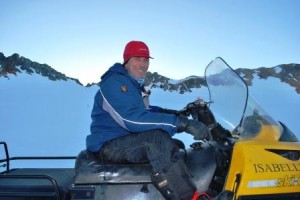
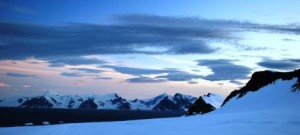
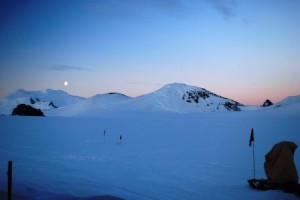 View from the caboose at 1am!
View from the caboose at 1am!
Tomorrow the JCR comes in this is the ship that brings relief (stores) to the base. The base last had stores brought in 12 months ago so we are living off the winter stuff. As relief starts on a sunday we had saturday morning off work. I was hoping to have saturday afternoon off as well so I could have a full day climbing peaks. However, we had training on the dive chamber to enjoy instead. I guess I do have to work at some point!
Last night after a long day of boatshed clearing and coxing a dive in south cove we had a good dinner and packed up overnight kit, ski kit and climbing gear into the box sled and Claire, Adam, Clive and I headed for the caboose up at Vals. We were up there by 8:30pm and skied till 11pm at Vals before heading into the warm caboose for some banjo playing and talking till 1am!
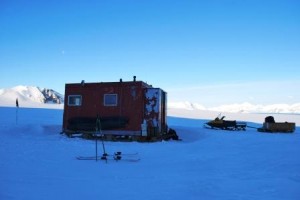
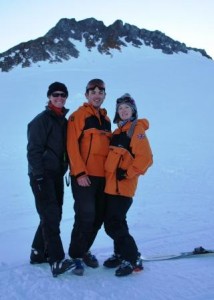
We rose at 7am this morning and took the skidoo to the base of the Stork range and roped up for glacier travel. It was a hard slog uphill and by 11:00am we were standing on the summit of my first peak conquered in Antarctica! Wow the view was amazing… We could see Alexander island in the distance 100miles away the air is so clear down here. We were using our new mountaineering skills and were roped together so four people in a row with quite a distance between.
![]()
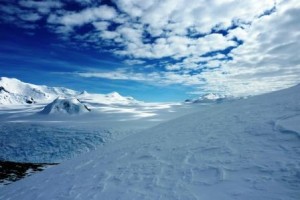
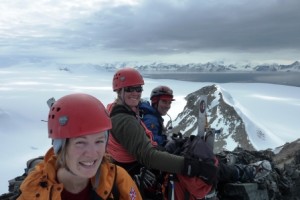
You can’t be complacent about travelling across glacier regions it really isn’t a stroll in the park. We got to the top and could see Rothera in the distance and as far as the eye could see the moutain ranges of the Antarctic peninsula. You can sit in the silence of the wilderness and hear artillery fire which is the ice shifting and icebergs calving. The Sheldon Glacier was really heavily crevassed beneath us miles away and the ice cliffs which are so large from the boats were reflecting on the water.
We followed our tracks back down making sure to stay in the track we had sucessfully come up. However, Adam did find a crevasse and went through the snow bridge Claire, myself and Clive our trusty mountaineer braced ourselves and pulled him out. He was trying to find a wall to get his campons into but swinging his feet around found nothing so the crevasse was quite large. After we got him out he carefully picked us a new route. I think he was a little shaken it just drives home the fact that you have to stay properly roped to someone like BAS teaches us.
None of us can believe we get paid to live and work in such an amazing place. We are all very lucky people down here at Rothera. Hope you have a great Saturday night. I am going to relax maybe run around the runway or go to the climbing wall (inside). Tomorrow the ships ETA is midday so it will be full on crazy for 3 days of relief.
For Henry!
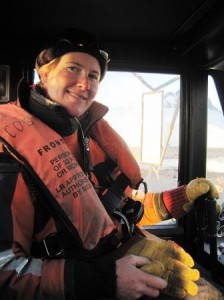
My brother told me that my three year old nephew was not interested in pictures of glaciers and icebergs and wanted pictures of machinery and animals so this post is for him. In a few days I will post some more for him of all the airplanes as he specifically requested a picture of the big planes! For now though these are pictures of the toys that Aunty Ash plays with everyday!
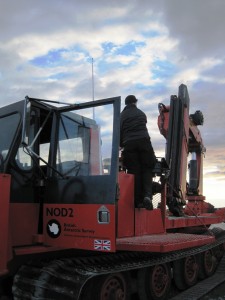

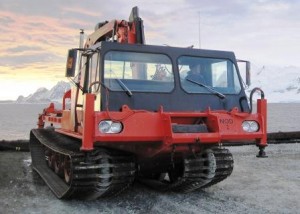

Happy Thanksgiving!
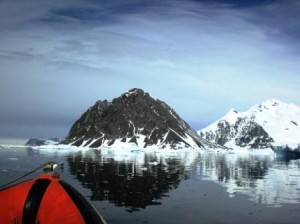
Happy Thanksgiving to those in the US I really did miss my turkey dinner today – hope you all have a relaxing time with your family.
Today Kevin needed to go back to Leonie for some more plant sampling. It was the clearest day we have had on the water since I got here beautifully flat calm so that the mountains reflected perfectly on the water.
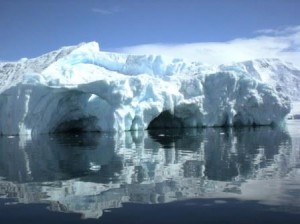
While Kevin and Clive were on Leonie we went out looking for the pinnacles for the dive team. Unfortunately as there was a leopard seal cruising the shallows we had to call off the dive. We drifted through the iceburgs with the engines off hearing them cracking and groaning.
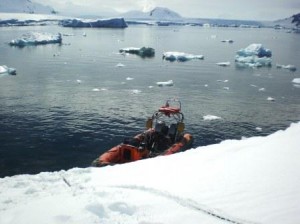
While waiting for the guys to finish we anchored up to the snow and checked out the depot removing some of the old two stroke fuel that was too old to be used and also inventoried it so that we can put some more stuff out there that will be useful.
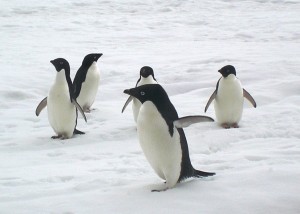
Lots of penguins around base today and yesterday they are very cute some of them were on the runway. So you here over the VHF which we have to all carry with us the air unit guys trying to remove animals so they don’t get squished.
11:15pm – Just got in from Marine Search and Rescue I had to have the boat at the wharf as we had a twin otter coming into land in a 30 knot crosswind with explosives onboard. We have to run on radio silence when there are explosives on a plane as there is a very slight possibility that they will detonate when a radio is used.
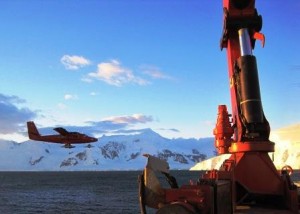
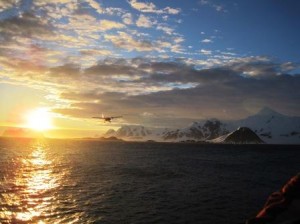
Doug was the pilot he is an ex tornado pilot and very experienced at running the twin otters this is his third season down here. He aborted his first landing and came is on the second. BAS really does hire people who are good at their job it was a stunning amount of skill to witness.
Boating, Diving and Skiing
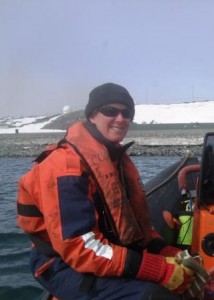
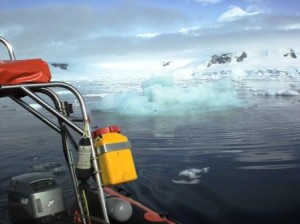
I went out diving in the afternoon with Terri to change out some loggers (science project) at Cheshire. It was only a 20 minute dive the sealife was amazing lots of sea cucumbers, fans, sea stars, brachioalpods. Every pieces of space is covered in flora and fauna. My hands were a lot warmer this dive however, I did manage to lose one of the fins which upset the diving officer a tad and made me feel like a little bit of a fool.
Clive, Claire and I took the skidoos up to Vals to go skiing and did a few hours of runs up and down the little slope. After all the snow yesterday there was a foot or so of powder. Claire had done a week of skiing in France and was pretty good the biggest problem was the light was really flat. The light on the mountain range on the peninsula was beautiful across the water and the light reflected pink on the icebergs. Yet another late night there really not enough hours in the day here.
Crevassing
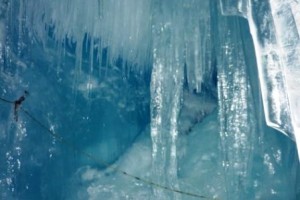
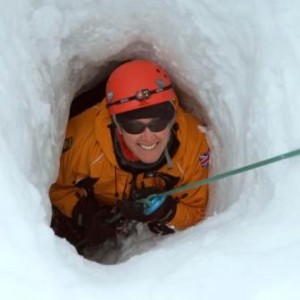
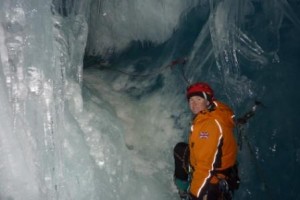
After a long day of boating it was time to go crevassing at the top of the ramp. There is a hole the size of a person that you abseil into at the bottom – 40 feet or so down there is a ice tunnel system. We were wearing hardhats, mountaineering boots, carrying our ice axes and wearing crampons. The light shone through the snow creating blue light and the icicles (ice sculptures) were stunning. There were a few places to crawl through and the crampon techniques we learnt were very useful.
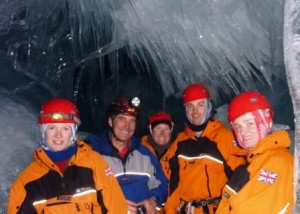
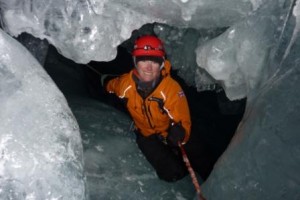
Boating and Diving
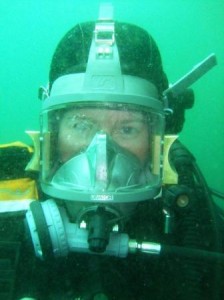 Today was my first day of real work and it included a check out dive off the wharf. It was a very long but fun day at work.
Today was my first day of real work and it included a check out dive off the wharf. It was a very long but fun day at work.
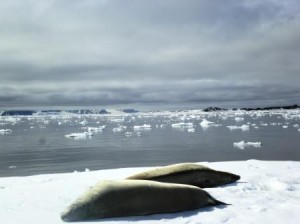
Starting at 8am I moved the crane down to the wharf and set it up then moved the workboat alongside it ready to take a scientist out to one of the islands. Then I moved the dive boat into position outside the dive stores with the tractor. We loaded the workboat with the scientist his field assistant (Clive) and all the necessary safety gear including P-rolls, manfood, iridium phone, extra clothing etc. just in case the pack ice closed in with the change of weather during the day and we couldn’t get back to them. We also loaded on Pete and his video camera and still camera.
After dropping the two off at Leonie Island we headed over to the Sheldon Glacier to do some filming stopping along the way to check out the wildlife – arctic terns, crabeater seals, shags, snow petrals, Adelie penguins were all on show! The change in wind direction has driven all the iceburgs and brash ice into Ryder Bay so it is quite slow going moving through the water which is at some points like slurpee.
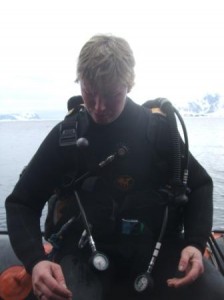
We got back late for lunch so after stuffing my face quickly I headed down to the dive store to get ready for my check dive. It was a short dive of only 17 minutes as we had to get the scientists out for a dive in the islands in the afternoon. There was quite a bit of sealife lots more than I was expecting and according to my buddy it was in fact denude in comparison to the other dive sites! My fingers within a few minutes of getting in the water were extremely painful from the cold shock it was like daggers in my hands not comfortable at all. The other divers assure me that I will get use to it! It was snowing very slightly when we got out of the water.
After a quick change from my drysuit to my boat immersion suit we were back on the water with the dive team to take over to Troval which is a small island. The team of David and Terri were trying to create a database of Antarctic species and bring back specimens they didn’t know in test tubes. By the time we had packed up it was 7:15 and we were 45 minutes late for dinner.
Dave Barnes the scientist we took diving did the monday night science talk on life beneath the sea in Antarctica it was all very interesting stuff. Which I will write about at some point!
It was also the day that I decided not to take up BAS’s offer of staying for 18 months. I was asked two weeks ago if I would extend my contract till April 2011 however, despite having a great time down here I have committments to my customers and family back and home so decline the offer. That is not to say that I will not be offered the job next year for 18 months…
Crevasse Rescue and Ice Climbing
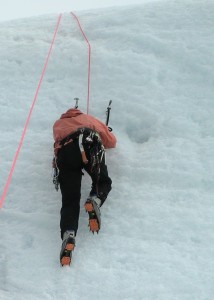
Sunday is a day off for some people on base including me (picture above is me ice climbing today!). The planes were still flying though taking people off into the field some are going for 90 days living in a tent on ice shelves doing a variety of experiments.
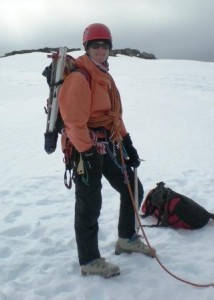
We didn’t finish all our field training last week so we had a little more to finish this morning including how to rope up as an alpine pair and the use of prussicks when travelling across glaciers. Basically you hope that if your partner falls through a snow bridge they will self rescue while you brace yourself. However as they might be injured you have to learn how to hoist the person from a crevasse. BAS uses a system called Z pulley system which provides a mechanical advantage to pull the person out of the crevasse.
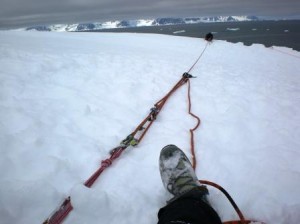
You have to first of all arrest the fall then place suitable anchors and link them together. After doing that you can take yourself out of the brace position as the persons weight is on the anchors and you can carefully go to the edge of the crevasse and assess the situation. While you are at the edge you prepare the edge as the line will be cutting into the snow so you use a ice axe and hammer to create a lip for the line to slide over you can also at this point descend if necessary to help out your injured partner. Next you construct a pully system using jumars and blocks and can hoist the person out.
After lunch (a cooked English breakfast) we went out for a few hours of ice climbing.
It is the first time I have done it and it really was great fun. A new sport to do in the evenings as the ice cliff is just behind the hanger less than a 1/4 mile from my room.
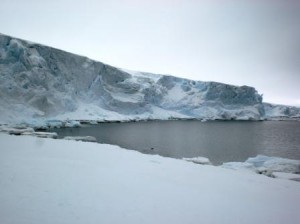
Another great day down south 🙂 Can’t believe I have only been here a week..
Rowing, Boating, Skiing and Running
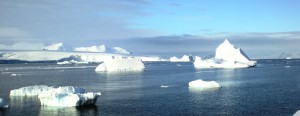
The wind shifted to the south the other day and cleared all the brash ice out of hanger cove leaving the big bergy bits.
There is so much to do on base and not enough time to do it in!
On Saturday we have a half day of work but it seems like most people work through saturday and sunday. I did my usual 5km row on the machine in the gym in the morning. I then had a morning of training including seal watch – which means for 30 minutes before the divers go in you have to watch the area of the dive for any leopard seals. Then I took the divers out for my first go at coxing the boat and as they were at their safety stop a leopard seal surfaced behind one of the icebergs so divers were called to the surface and were quickly brought into the boat. Once we see a seal you are not able to dive for 4 hours so my morning check out dive was cancelled.
After a few hours cleaning up some things in the boatshed Adam and I went up to Vals the little ski hill. The light was pretty flat but we managed to use the skidoo to groom some of the run. We spent a few hours doing runs burning quite a bit of skidoo fuel as we would drive a skier up the hill and then drive down next to the skier.
After skiing Claire had come back from her flight as co pilot and her and I went for a run on the runway. After the first time around penguins were spotted next to the runway so we had to stop and watch five adele penguins do their thing unfortunately I didn’t have my camera – next time.
Saturday night is fancy dinner night where we have table cloths and wine. As I don’t drink I had Ribena which there is plenty of on base. The chef makes a three course meal which was really good. We had fruit salad for starters followed by fish stew and NZ green lipped mussels, brocolli and mash. For dessert we had a cheese cake in filo pastry with strawberries on top. Lee the chef is really doing a great job with frozen and canned food!
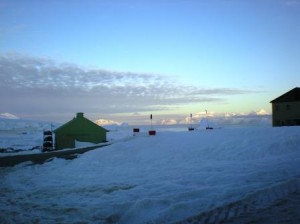
The sun doesn’t set at the moment so between midnight and two you have twilight seen in the above picture.
Tractor driving, crane driving and boating
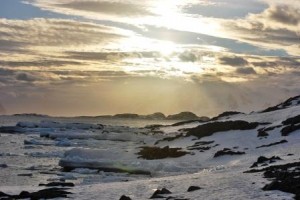
On friday I spent the morning cleaning some things in the boatshed followed by a morning of learning how to drive the tractor and a refresher on the crane. I use the tractor and the crane every day several times a day as everytime the boat is used it is launched and then taken out the minute you get back to the dock.
The afternoon was taken up going out with some divers in sout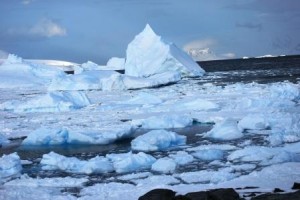 h cove and then going for a ‘jolly’ with base commander to see all the dive sites around Ryder Bay and the landing areas for the huts that are on the islands nearby. It was amazing weaving around massive icebergs and little bergy bits. The iceburgs are beautifully scupltured and depending on how the light hits them are turqoiuse blue or even pink. It was quite mild -1C but next time I think I will wear my liner gloves as well as my work gloves. By the time we got the boats out and the engines flushed it was time to go in for dinner.
h cove and then going for a ‘jolly’ with base commander to see all the dive sites around Ryder Bay and the landing areas for the huts that are on the islands nearby. It was amazing weaving around massive icebergs and little bergy bits. The iceburgs are beautifully scupltured and depending on how the light hits them are turqoiuse blue or even pink. It was quite mild -1C but next time I think I will wear my liner gloves as well as my work gloves. By the time we got the boats out and the engines flushed it was time to go in for dinner.
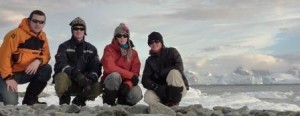
After dinner we walked around the point for the third time since we have been here. However, this time we were treated to a science talk about all the different science happening on the point. There are instruments that measure shooting stars and their trail apparently there are 4 per minute. This information is useful as it allows us to learn what is happening 60-90km into the atmosphere with regards to the wind direction and speed.
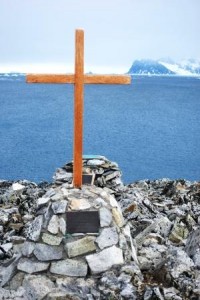
There is a memorial at the top of the point to people who have died while working from Rothera. Including one for Kirsty the marine assistant, a number of guys who ended up on sea ice that broke up and stranded them and also for an air crew that hit an iceberg just at the end of the runway on take off.
It was another late night as there is just too much to do on base. Adam serviced my skis ready for some skiing hopefully this afternoon.

